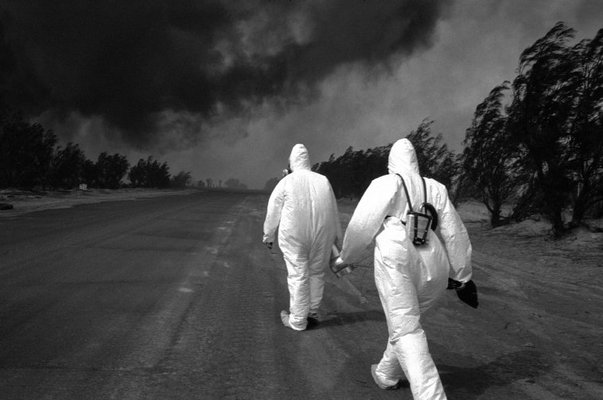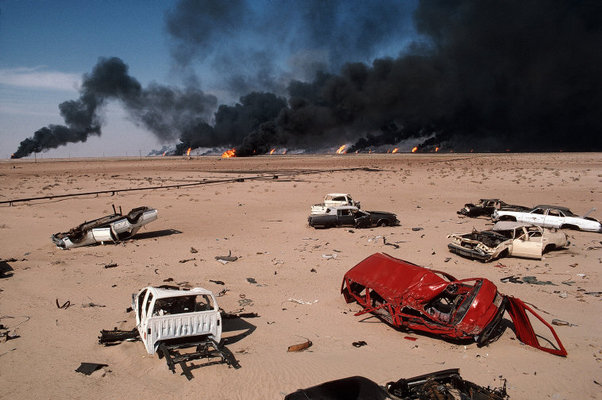



 Slate's daily photo gallery with some incredible photos capturing the damage done in the first Gulf War... which began 17 years ago this week.
Slate's daily photo gallery with some incredible photos capturing the damage done in the first Gulf War... which began 17 years ago this week.www.ritikdholakia.com




 Slate's daily photo gallery with some incredible photos capturing the damage done in the first Gulf War... which began 17 years ago this week.
Slate's daily photo gallery with some incredible photos capturing the damage done in the first Gulf War... which began 17 years ago this week.

This story in this morning's Post about Green Zone authorities putting out 'tip sheets' about visiting Democratic lawmakers that read like they were written by the RNC is a really big deal. It's all par for the course for this administration, how they've politicized every branch of the government and every agency, eroding democratic institutions in American while they pretended to build them in Iraq. In fact, from the start the White House tried to stock the Green Zone and the US occupation authority with GOP operatives. But I thought that had changed a little. This latest incident, though, should trigger a number of forced retirements and resignations.But aside from the issue of politicizing the Green Zone, isn't this little tid-bit from the Post story even more odd?
Now, depending on what cartoon it was ("Itchy & Scratchy," "The Road Runner"), I suppose there mightBut even such tight control could not always filter out the bizarre world inside the barricades. At one point, the three were trying to discuss the state of Iraqi security forces with Iraq's national security adviser, Mowaffak al-Rubaie, but the large, flat-panel television set facing the official proved to be a distraction. Rubaie was watching children's cartoons.
When Moran asked him to turn it off, Rubaie protested with a laugh and said, "But this is my favorite television show," Moran recalled.
Porter confirmed the incident, although he tried to paint the scene in the best light, noting that at least they had electricity.
"I don't disagree it was an odd moment, but I did take a deep breath and say, 'Wait a minute, at least they are using the latest technology, and they are monitoring the world,' " Porter said. "But, yes, it was pretty annoying."


1. History is biography. I’m amazed at the role that personal biography played in the framing of this war. Wolfowitz and Douglas Feith, whose family survived the Holocaust, were intellectuals who felt they were fulfilling the promise of “Never Again,” a promise that had been failed in Yugoslavia, Rwanda, etc. Rumsfeld, Cheney, and Wolfowitz felt that they had been let down, and they, in turn, let down the Iraqi people, by being pulled back during the First Gulf War. Quit stunning the level to which Ricks portrays these factors directly influencing the rhetoric and decision making of senior officials leading in to this war effort;Part II: Into Iraq
2. Forget the professionals. It is shocking how easily the recommendations of senior military officials, like General Eric Shinseki, General Jack Keane, and retired General Anthony Zinni were disregarded in both the selling of, and more gallingly, the planning of the war. Consequences of this range from the failure to “finish the job” in Afghanistan before opening a front with Iraq to the apparent decision of Rumsfeld to not only disregard the Army’s preferences to invade with overwhelming force in order to, essentially, try out his theory of a lighter, more agile armed forces.
3. The failure of politics. Ricks doesn’t spend a lot of time discussing Congress inaction in questioning the war, or failure to call the timing or the planning into question, but as a body, and as a necessary piece of government, they are conspicuous in their absence. The troubling question is if the problem runs deeper than some 535 people in a climate of war, specifically, if the two-party political dynamics of this Republican party and this Democratic party make it impossible for independent-minded members of Congress to stand up and be heard.
4. The failure of intelligence. It’s hard to blame the intelligence community for failing to get their perspective on WMD and the threat of Iraq right. There are enormous systematic failures in the intelligence community, that is clear. It seems that these failures may be bandaged by extra resourcing and a change in approach, but it is not clear that until America, and specifically, Americans, start engaging more evenly with the rest of the world, that we will be able to gather the sort of specific, culturally-sensitive intelligence that will allow us to judge “enemies” that we simply do not care to understand.
1. Lessons never learned. Making an analogy to Vietnam, during this time period, was taboo. But what is most striking is not that Iraq was or is becoming another Vietnam, but rather, that the lessons learned in Vietnam were apparently forgotten prior to Iraq. More specifically, it appears that the Army invested so heavily in its military and political apparatus in avoiding another Vietnam, that it was ill-trained in how to operate when confronted with another Vietnam-like situation, where the population needed to be won over, not through force, but through soft means, where the tactical fighting was guerilla warfare, and where it was impossible to tell the good Iraqis from the bad Iraqis.
2. No news is good news. When I try to figure out what exactly constitutes systematic failure among the organizations responsible for the planning and execution of this war, the only thing that truly stands out to me is the insistence of senior officials, elected, bureaucratic, and military on averring from bad news. Bad news did not represent reality, did not signal a situation that needed to be managed, was the symptom and not the disease. Bad news was false, inaccurate, biased, for losers.
3. The failure of planning. At many levels, from the Defense department, though the Joint Chiefs and CentComm, down to lower levels of active forces in Iraq, it is clear that many leaders failed to plan. They failed to plan for worst-case scenarios, they failed to resource middle case scenarios, and they predicated their operations on best-case scenarios. This isn’t even Management 101, how did this happen?
4. The failure of leadership. Unfortunately, and the most troubling thing to come out of Fiasco for me, much of the failure of planning and the failure to account for bad news came down to the political and military leadership. The political leadership had no use and no interest in adequately understanding, planning for, and confronting the true issues in Iraq, and the military leadership lacked the fortitude and the culture to confront the political leadership. Why the military failed is understandable, but a failure nonetheless. Why the civilian leadership failed is less clear, and until some historian can really lay that one to bed, the conspiratorial whispers and concerns about the bad faith and incompetence of this Administration won’t be laid low.
1. Should we stay or should we go? I have no idea. Fiasco does a wonderful job telling us about the mess we’re in, but less of a job pointing the way out. The strategic and political considerations or complex, I don’t even begin to understand them. To borrow a bad metaphor, I feel like America is pot-committed, at this point, both strategically and morally, and that to leave would be in error.
2. What becomes of all this? Again, I have no idea. Recently, I’m interested in exploring further, as Ricks touches on briefly in his afterword, cases in history where countries were unable to achieve their goals in conflict abroad. Take Vietnam, or Algeria. Generally, these are characterized as tactical wins, but strategic losses – meaning a narrowly defined political victory was achieved, but the greater goals of the victorious nation failed or were diminished. But is this true, in history’s long view? What of Algeria, and France? And what of Vietnam and the US?